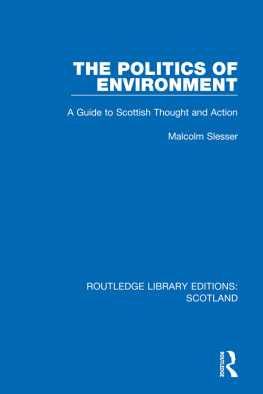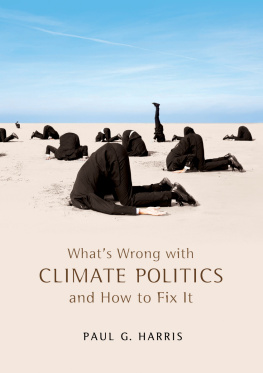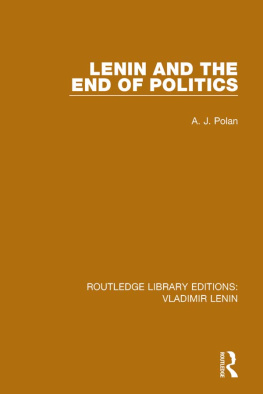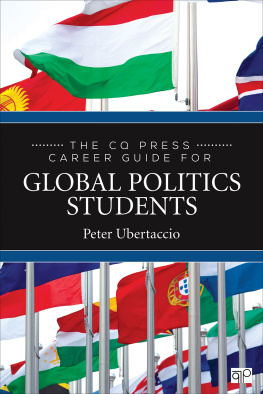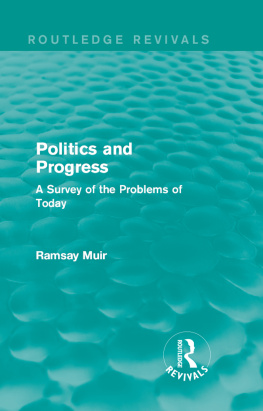ROUTLEDGE LIBRARY EDITIONS:SCOTLAND
Volume 28
THE POLITICS OF ENVIRONMENT
First published in 1972 by George Allen & Unwin Ltd
This edition first published in 2022
by Routledge
2 Park Square, Milton Park, Abingdon, Oxon OX14 4RN
and by Routledge
605 Third Avenue, New York, NY 10158
Routledge is an imprint of the Taylor & Francis Group, an informa business
1972 Malcolm Slesser
All rights reserved. No part of this book may be reprinted or reproduced or utilised in any form or by any electronic, mechanical, or other means, now known or hereafter invented, including photocopying and recording, or in any information storage or retrieval system, without permission in writing from the publishers.
Trademark notice: Product or corporate names may be trademarks or registered trademarks, and are used only for identification and explanation without intent to infringe.
British Library Cataloguing in Publication Data
A catalogue record for this book is available from the British Library
ISBN: 978-1-03-206184-9 (Set)
ISBN: 978-1-00-321338-3 (Set) (ebk)
ISBN: 978-1-03-207650-8 (Volume 28) (hbk)
ISBN: 978-1-03-207682-9 (Volume 28) (pbk)
ISBN: 978-1-00-320825-9 (Volume 28) (ebk)
DOI: 10.4324/9781003208259
Publishers Note
The publisher has gone to great lengths to ensure the quality of this reprint but points out that some imperfections in the original copies may be apparent.
Disclaimer
The publisher has made every effort to trace copyright holders and would welcome correspondence from those they have been unable to trace.
THE POLITICS OF ENVIRONMENT
Including
A Guide to Scottish Thought and Action
by Malcolm Slesser
London . George Allen & Unwin Ltd
Ruskin House Museum Street
First published in 1972
This book is copyright under the Berne Convention. AH purpose of private study, research, criticism or review, as permitted under the Copyright Act, 1956, no part of this publication may be reproduced, stored in a retrieval system, or transmitted, in any form or by any means, electronic, electrical, chemical, mechanical, optical, photocopying, recording or otherwise, without the prior. permission of the copyright owner. Enquiries should be addressed to the publishers.
Malcolm Slesser 1972
ISBN 0 04 320074 5 Cased
0 04 320075 3 Paper
This book is dedicated to My Neighbour
Printed in England
in 11 point Baskerville type
by Clarke, Doble & Brendon Ltd
Plymouth
CONTENTS
Part I Nations at the Crossroads
Part II The Scotland of Tomorrow
2. Resist and Achieve
2. The Balanced Communities
3. Resource Management
4. The New Politics
- Part I Nations at the Crossroads
- Part II The Scotland of Tomorrow
- 2. Resist and Achieve
- 2. The Balanced Communities
- 3. Resource Management
- 4. The New Politics
Guide
I, Malcolm Slesser, am really only the editor of this book, presenting here some of the ideas being worked over by a growing number of those responsible for advances in science, technology and commerce in Scotland and elsewhere. These people, themselves specialised products of modern society, are not only aware of the malaise now obviously affecting this society, but by the very nature of their work have been forced to recognise its cause. The rapid growth of technology, so beneficial to man, has precipitated a crisis in the evolution of his society and, as in previous evolutionary crises of other living beings, an initially useful feature has galloped away out of control; our crippling dinosaur armour, our self-destroying sabre-tooth, is industrialisation. This excellent servant is a deadly master. Encouraged by the more ambitious practitioners of the as-yet naive science of economics, this expanding industrialisation is today destroying the land and its communities, and tomorrow there must be heavy retribution.
The protests of the conservationists, the apparent unreason of affluent strikers, the violence of students, the attempts to escape through drugs into fantasy, are all symptoms of our growing unease: for it is obviously a great strain to pretend that we can continue to cram an infinitely expanding economy into a finite land - something must burst, and the greater the pressure the bigger the bang. But how can we stop it? Should we ourselves even bother? The ever-stretching affluence might just last out our time - our children can inherit the ruins.
For certainly our time is short. Affluence no longer decides our consumption, but is itself solely and precariously dependent on the accelerating increase of this consumption. Hence the desperate search for wider boundaries, like that belt without a buckle, the European Common Market. But these make shifts are of little use, as is increasingly evident; based on the sickness they try to cure, they merely exacerbate the situation.
A return to a balanced economy, where technological progress plays its correct part subservient to the individual, is obviously necessary. But such a return is extremely difficult for communities already violently pledged to imbalance by over-industrialisation and sometimes by over-population as well. Such communities expand forcefully, with the most plausible excuses, into their more favourably situated neighbours -usually after weakening any economic or cultural resistance. The USA has Canada, Mexico and the rest. The USSR has its vast eastern territories and satellites. England, more constricted and more desperately committed, has now only Scot land and what charity Europe may allow her.
The less committed nations have a chance to readjust with less upheaval, provided they can ward off the surrounding pressures. This book examines particularly the position of Scot land. It offers merely an outline, but its deliberate simplicity should not be taken as the last word; more detailed treatment of the subjects has been under way for some time. We have here tried only to put across the message.
For a message is badly needed. The planned flooding of Scotland with English workers and industries cannot possibly cure Englands imbalance; but, to gratify the temporary indulgence of her addicted neighbour, Scotland as a community will be destroyed permanently and the regeneration of England made more difficult-for there would not be available the example of a restored and progressive society over the Border.
This book is in four parts. illustrates how the land, the spirit and the future of the Scottish people are disappearing under sterile colonisation by an out dated British economy, and describes how each member of the Scottish community can play his or her part in defeating this planned eradication, and so save the promise of the future for our children.
These three parts are deliberately brief. They are to be read as a handbook to further thought and action, as a framework round which discussion groups can build a more comprehensive structure. The authors have met so many who hold these views and have so signally failed to find them printed anywhere in relation to Scotland, that they judge such an abbreviated treatment to be necessary at this time.
The fourth part gives a wider background to the first three. It illustrates how leading scientists and economists confirm the dangers of runaway expansion of industrial aggression in a world growing smaller and indicates the disasters which await continued biological imbalance in a world becoming more crowded; in this context, it examines further applications of technology for the more satisfying Scotland of the future. It may be read as complementary or supplementary to the first three parts, or simply as a beneficial and instructive irritant in its own right.

